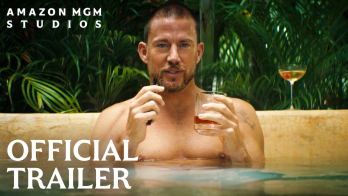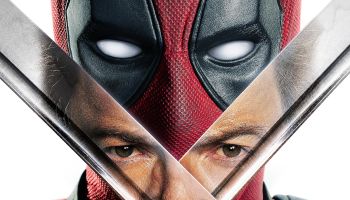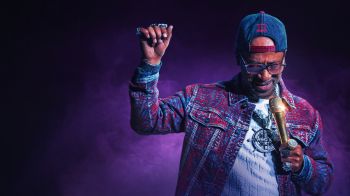GlobalGrind had the opportunity to watch a special conversation between the Godfather of Hip-Hop Russell Simmons and former U.S. Representative serving Tennessee’s 9th congressional district, Harold Ford Jr.
Today, Mr. Ford lends his considerable talents as managing director for Morgan Stanley.
STORY: Stop The Bitchin’ And Get To Work!
Sponsored by Morgan Stanley Smith Barney and partnered with the Rush Philanthropic Arts Foundation, the two men sat down and had a conversation at the New York Times building in their state of the art auditorium.
STORY: Stop Bitchin’ Part 2: Pay Your Damn Taxes!!
The two titans of industry had a lengthy, informative and at times funny discussion, ranging from topics dealing with President Barack Obama, to Bill Cosby and the current state of hip-hop.
Take a look at some of the highlights of the evening.
[pagebreak]
So explain to me this. I asked questions for a reason. Your book is called “Super Rich,” a guide to having it all. Explain to me how do you do that. What inspired you in writing this, seriously?
The book was written a lot before the title was given. My ex-wife gave me a title. Okay quick story: The bathroom was so far from the bedroom. It was the 40,000 square foot house and I was getting older and I thought I was going to pee on myself. The bathroom was right outside the door. But what I have learned, you know, as I get older. No matter how good your are, your ass can only fit in one seat at a time.
And I think the book is about that and about being confortable in that seat. The definition is in the first chapter, was redefining ‘Rich,’ and I define it as a state of not needing nothing. I said that to my brother Rev. Run, I come from a long line of preachers, with Rev. Ike being the first one and Bishop Jordan being the second and he read part of the first chapter and I said, ‘Man I don’t think this is going to fly, Russ.’
The moral of the story is that him and I discussed years ago, when he first started preaching. How Jesus taught two sermons. One to the masters, if you lived a certain life, there’s a certain kind of service and you would have no problem paying your taxes; on time. No problem. If you are a good giver, you get great gifts.
The second sermon was the disciples; if you lived this life you would be happier and close to God. And that’s the giver; we all like the God that comes with it. He knows your craft, he studies your craft, and he gives you what you need. If you don’t like it, your mannerisms, he will leave you; right there. That brings the good giver, a selfless servant who rises in the ranks.
The book is more about that French benefit, but the book is really about a state of happiness. Christians, Buddhist and the book is basically yogi scripture. The book is basically about a state of happiness that we are all striving for; this level a comfort. A prosperity teacher would say that’s a range of abundance, if you operate on that kind of spirit.
[pagebreak]
You are trailblazer and pioneer, as I touched on in the introduction. You’re the beginning of celebrity and you’re publicity. Russell Simmons, that we all know because of all the trailblazing work you have done and creating and introducing the genre we all know as hip-hop.
Where do you start? When finding artists like the Beastie Boys to RUN DMC, where you see today were the hardest people to sign, including Jay-Z. Obviously you’re work with Def Jam. How do you assess the state of music, in particular the state of hip-hop today?
Well you know, it really hasn’t changed much. The poets are still good mirrors. They come from communities and they say things that make us uncomfortable. These are the same things, that alarm us, that shock us, laugh at us and remind us. The collective does a lot of unconscious stuff. I start, the wrong path of abusing, the choices that we make as a group.
The hip-hop artist sometimes brings this out and we are so shocked to hear them say things in our hearts and what we actually do. In terms of examples of our own sickness. There was a whole discussion about hip-hop being so homophobic or racist. I don’t think they are homophobic or racist.
Justin Bieber was at my house with my nephew Diggy this past weekend and they’re friends, so it seems like it really doesn’t matter where you grow up. I don’t think it’s racist, not homophobic. I will tell you one thing, rappers aren’t nearly as gangster as this government!
[pagebreak]
What about the argument that some have, including Bill Cosby the terrific champion about young black men as fathers; he suggested, no strongly stated, that he believes that some of the music is something enjoyed as music, as the rhythm of the beat.
Can an argument be made that music has changed from Kurtis Blow’s day and now, that the lyrics have changed?
There were good songs after Kurtis Blow like “Fuck The Police” these songs, you know. There were moments when we had Public Enemy, you know! And that’s special; part of it was the expression. You know what’s happening, it was good for the community. You have songs from “Jesus Walks” to more street songs. I don’t think it has changed anything. And about Bill Cosby, I think he really loves Black people and all people so much.
He’s disappointed that the work that he did and some of the civil rights leaders did, to open doors. He’s disappointed that Blacks did not walk through the doors.
The industry is different and every industry that I am is different. Diversity means segregation. Anyway, the doors that he opened, he forgot about the crack epidemic, the heroin epidemic, all kinds of experiences that Black community has had. There’s a lot of integration he fought for, at the same time, he didn’t take the advantage of it.
Let’s go to the music thing for a moment.
Hip-hop has done more to put the President in office and change the dynamic of the country. You know the kids in Beverly Hills have a better understanding of the mind and struggles of the kids in Compton.
The first urban hip-hop graduate generation really understands a lot more about plight and many of them, because of their experience with hip-hop, understands and feels closer and makes better choices. In terms of race relations. It’s phenomenal.
Who is your favorite artist today?
Jay Z, Kanye West. Those are the last people I signed, so yeah! I would like to say my nephew, but I saw my younger brother eat him up on the BET awards for the father and son battle.
[pagebreak]
You have taken Russell Simmons from music and the influence you have in television and film. How did you manage your brand? We work for the most dynamic and wonderful franchise on Wall Street, here at Morgan Stanley.
Our brokers are out trying their hardest to bring new business and obviously to keep and maintain the trust of their clients. Your career, your evolution has really been remarkable for anyone in any space. Where you have transcended and dominated places. How have you done it? How have you maintained your brand and what advice would you give to those of us at Morgan Stanley?
Well you know, I learned these things through experiences and I read them again through scriptures. And this idea of really, really to first instill in us new ideas. You guys work in numbers, but you still need creativity. So I recommend everybody to do, if nothing you do is read that third chapter of the book “Mediation.”
I think you can watch your thought and make different choices and not emotional, but just from a distance you can see and be a watcher in life. And I think that, my ability of starting new businesses in branding. Branding business has come from just seeing real big white spaces and un-transferring need. People need. Some people think look around for the white space because it’s so difficult to find it and in other words, people don’t have nothing. So they only have a few things and sometimes I actually feel like damn, they need so much. But I can only do so much at one time.
[pagebreak]
Hindsight is 20/20, what would you tell the 25-year-old Russell Simmons?
Why you take so many fu*king drugs? I’m a vegan now, so I should say this because it’s important, I don’t eat any animal products, dairy, egg or fish. I think one of the worst things in human history is the 15 billion suffering farm animals.
It takes up all the oil that the army doesn’t take, all the grain, all the water that could feed the starving people. And not to mention the abuse, I mean animals born into suffering like that it makes you sick. Do I look sick? I’m 100. So I don’t feel sick since I stopped eating animals 12 years ago.
On behalf of Morgan Stanley we would like to thank you for taking time out and sitting down for this conversation, thank you!
Thank you.
















